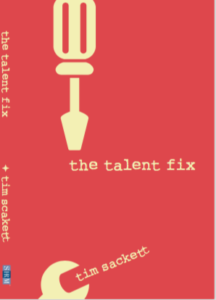By now I hope you know I wrote a book! If not, guess what I wrote a book! The Talent Fix: A Leader’s Guide to Recruiting Great Talent is a top-rated Talent Acquisition book on Amazon and the best selling book at SHRM’s Talent Conference (Top 8 at SHRM National, which was really cool!).
Also, it was recently approved for SHRM CP and SCP recertification credit!
So, you buy the book. You read the book. And SHRM and I will approve you for recertification credit of your SHRM CP or SCP! Okay, I have really have nothing to do with approving your SHRM CP and SCP! 😉
One Big Takeaway
I had a reader reach out to me last week. They just got done reading the book and they shared one of the big takeaways they got from the book, and it wasn’t one I would have expected!
When you think of Employment Branding and Recruitment Marketing (Chapter 7) we tend to think that it’s first Employment Branding (EB) and then it’s Recruitment Marketing (RM). In fact, these two functions within Talent Acquisition are really completely separate!
This reader, like most us, believed these two were attached at the hip. You first created your EB, you then used RM to get your EB shared to the audience you were going after.
After reading my book she realized these two functions really have nothing to do with each other. Both can live without the other. You can use a great RM strategy to promote your jobs and organization and get very good results.
You can create an awesome EB and share that with candidates without any type of RM strategy or technology and it can be great. There is no need to have both, but both working together create a synergy that one does not have without the other!
Create a great EB and create a great RM machine and you will see results that are far better than anything else you’ve done. Far too often I see organizations that focus most of their effort and resources on one side and not the other.
I naturally put these two together within the chapter because I would never do one without the other. It doesn’t make sense to me, but you can. In reality, we all have an employment brand within the market, whether you actually created it or not.
Many times we internally think way higher of our EB than the actual market in which we are hiring gives us credit. Most of us will have an EB that the majority of our hiring audience has no idea about. Which is why a great RM strategy is critical to finishing off great EB work.
You can do one without the other, but rarely will it ever make sense.
Okay – that’s like 1/16th of a SHRM CP or SCP credit – go buy the book and get the rest!

